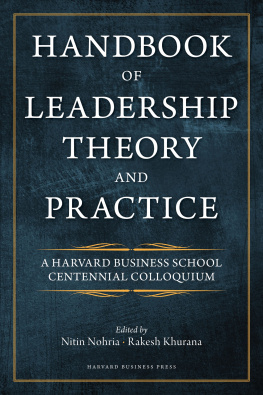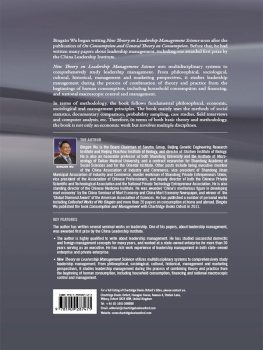FOLLOWING REASON
Throughout history, humanity has regularly followed anti-rational figures and forces: demagogic rulers, perverted deities, exploitative economic systems, and so on. Such leadership and followership have wrought all kinds of oppression and conflict. What if this pattern could be altered? What if society were led by Reason instead? Prompted by Ciceros exhortation to follow reason as leader as though it were a god, Following Reason: A Theory and Strategy for Rational Leadership explores this intriguing and potentially transformative possibility.
Manolopoulos uniquely blends leadership psychology with a deep understanding of philosophical reasoning theory to show how leaders can bravely reimagine and reconstruct society. The book retraces leadership mis-steps in history, and proposes a more logicentric theory of leadership built on compelling philosophical axioms and arguments. Following Reason emphasizes the weight of philosophy and cognition in leadership, and advocates for a diverse network that can create, uphold, and implement a blueprint for a better global society.
This wide-ranging and timely book is ideal for leadership, management, and philosophy students at undergraduate and graduate levels.
Dr Mark Manolopoulos is a Research Associate in Philosophy at Monash University, and a former Research Fellow at Swinburne Universitys Leadership Institute. He is the author of Radical Neo-Enlightenment (2018), If Creation is a Gift (2009), editor of With Gifted Thinkers (2009), and author of numerous scholarly journal articles and op-ed pieces.
LEADERSHIP: RESEARCH AND PRACTICE
Series Editors
Georgia Sorenson, Ph.D, Mller Leadership Scholar and Mller By-Fellow, Churchill College, University of Cambridge, Founder of the James MacGregor Academy of Leadership at the University of Maryland, and co-founder of the International Leadership Association.
Ronald E. Riggio, Ph.D, Henry R. Kravis Professor of Leadership and Organizational Psychology and former Director of the Kravis Leadership Institute at Claremont McKenna College.
College Student Leadership Development
Valerie I. Sessa
Exploring Distance in Leader-Follower Relationships
When Near is Far and Far is Near
Edited by Michelle C. Bligh and Ronald E. Riggio
Womens Leadership Journeys
Stories, Research, and Novel Perspectives
Edited by Sherylle J. Tan and Lisa DeFrank-Cole
Snapshots of Great Leadership
Second Edition
Jon P. Howell and Isaac Wanasika
Whats Wrong with Leadership? (And How to Fix It)
Edited by Ronald E. Riggio
Following Reason: A Theory and Strategy for Rational Leadership
Mark Manolopoulos
For more information about this series, please visit:https://www.routledge.com/psychology/series/LEADERSHIP
First published 2019
by Routledge
52 Vanderbilt Avenue, New York, NY 10017
and by Routledge
2 Park Square, Milton Park, Abingdon, Oxon OX14 4RN
Routledge is an imprint of the Taylor & Francis Group, an informa business
2019 Taylor & Francis
The right of Mark Manolopoulos to be identified as author of this work has been asserted by him in accordance with sections 77 and 78 of the Copyright, Designs and Patents Act 1988.
All rights reserved. No part of this book may be reprinted or reproduced or utilised in any form or by any electronic, mechanical, or other means, now known or hereafter invented, including photocopying and recording, or in any information storage or retrieval system, without permission in writing from the publishers.
Trademark notice: Product or corporate names may be trademarks or registered trademarks, and are used only for identification and explanation without intent to infringe.
Library of Congress Cataloging-in-Publication Data
Names: Manolopoulos, Mark, 1968- author.
Title: Following reason : a theory and strategy for rational leadership / Mark Manolopoulos.
Description: First Edition. | New York : Routledge, 2019. | Series: Leadership: Research and practice | Includes bibliographical references.
Identifiers: LCCN 2018050745 (print) | LCCN 2018060885 (ebook) | ISBN 9781315542058 (Ebook) | ISBN 9781138650572 (hardback) | ISBN 9781138650589 (pbk.)
Subjects: LCSH: Leadership. | Psychology, Applied.
Classification: LCC BF637.L4 (ebook) | LCC BF637.L4 M266 2019 (print) | DDC 303.3/4--dc23
LC record available at https://lccn.loc.gov/2018050745
ISBN: 978-1-138-65057-2 (hbk)
ISBN: 978-1-138-65058-9 (pbk)
ISBN: 978-1-315-54205-8 (ebk)
For Reasons martyrs
As often happens with defining moments, the origins of this book were rather random: when I commenced working as a Research Fellow at Swinburne Universitys Leadership Institute, I decided to enter the words Reason and leader into the Google search engine. I had no idea what to expect. I cant recall how many hits I received. I dont think there were many which is itself rather telling. But the most relevant entry, the one that immediately caught my attention, referred to a line from a book by the Roman philosopher Cicero. It simply stated as if out-of-hand, without any fanfare or lead-up: follow reason as leader as though it were a god. This book is a result of that serendipitous discovery. So the first person I would like to thank is Cicero, whose ten little words opened up a wondrous path for me to joyfully wander. Second, I wish to thank the people associated with this project. First of all, there are the Series Editors of Leadership: Research and Practice, Georgia Sorenson and Ron Riggio. Im very grateful they encouraged me to foster my inkling that Ciceros apparently forgotten proposition might be ripe for exploration. Im also very thankful for having an Editor like Christina Chronister, and I also wish to extend my gratitude to the rest of the staff at Routledge/Taylor & Francis who have been involved in the works production, including Editorial Assistant Charlotte Mapp. They have all been impressively supportive of this project, nurturing it with a relatively rare and much-appreciated positivity and kindness. I would also like to thank the anonymous reviewer for their incisive (and also encouraging) feedback: the book is much better for it. Finally, I wish to thank my family and friends for their love and understanding, particularly my wife, Paula.
We live today in a world of divisions and alternative facts an increasingly polarized society divided along racial, religious, national, political, and ideological lines. Much of this is due to irrational and non-logical thinking. In this book, Mark Manolopoulos explores what rational leadership would look like, and discusses the positive transformations that would occur with quality leadership. In this interesting and deep analysis of leadership, Manolopoulos takes on some of the fundamental questions that leadership scholars have debated for decades. It is a must-read for any scholar or practitioner who wants to take a deep dive into the dynamics of leaders and leadership.
Ronald E. Riggio, Kravis Leadership Institute,
Claremont McKenna College
Georgia Sorenson,
Churchill College, University of Cambridge
Its a Mad, Mad, Mad, Mad World is a 1963 comedy directed by Stanley Kramer, whereby a group of colorful characters clamor across California to find buried treasure. The film itself is a rollicking ride, though not wildly unforgettable but Ive always found the title especially memorable: perhaps it was an early/the earliest instance in which I was confronted with the stylistic power of repetition. But the movie title is interesting not just for its brilliant use of a literary device: it may, today, also be read as signifying multiple meanings of mad perhaps even four key meanings (the amount of times the word appears in the title). For mad can signify insanity, e.g., a person is diagnosed as being mad; it can also refer to anger, e.g., a person gets mad; a third meaning is the colloquial or slang one, where the term indicates a chaotically enjoyable experience, e.g., someone has a mad time at a party (akin to crazy in the sense of having a crazy time). As for a fourth meaning? The word mad could also indicate the anti-rational, in other words, a madness that opposes Reason. The prefix anti- is crucial: there is that which might express but also exceed rationality or is












